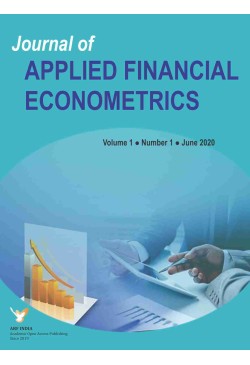
Journal of Applied Financial Econometrics
Frequency :Bi-Annual
ISSN :2583-374X
Peer Reviewed Journal
Since its outbreak in China in December, 2019 and subsequent spread to Nigeria in February 2020, coronavirus disease (COVID-19) has been contagious in effect, not only medically but financially, thereby causing feverish behavior among investors. This is perceived to have potential impact on stock market returns generally and banking sector’s stocks returns in particular. Therefore, this research aims to empirically determine the effect of COVID- 19 on stock returns, with a focus on the Nigerian banking sector whose stocks are one of the most traded in the Nigerian stock market. This study applies Pearson correlation and Ordinary Least Squares regression technique in the investigation of the reaction of Nigerian banking sector’s stock returns to COVID-19 new confirmed (positives), discharges(recoveries) and fatalities (deaths) cases. Secondary data on weekly basis in respect of COVID-19 and banking sector’s stock returns were obtained from the websites of the Nigeria Centre for Disease Control and the Nigerian Stock Exchange respectively. The 34-week event study began on March 2, 2020 and ended on October 25, 2020. Empirical findings show a negative and weak correlation between coronavirus and banking sector’s stock returns in Nigeria. The regression results indicate that every new confirmed (positive) case of coronavirus in Nigeriah as a negative and significant effect on the returns of the banking sector’s stock in Nigeria. This study therefore concludes that coronavirus has significant debilitating effect on the banking sector’s stock returns in Nigeria. It is therefore suggested that investors should focus on portfolio rebalancing with is skewed towards other securities other than stocks but more of fixed-income securities (such as bonds, debentures) as well as real-estate investments.
Keywords: Banking sector; Coronavirus; COVID-19; Stock returns; OLS.
JEL Classification Codes: G14, G21, I10
The dynamic causal relationship between financial development and economic growth in India is analysed over the postliberalisation period from 1992 to 2016 taking into account the influence of economic reforms on economic growth and financial development, applying the autoregressive distributed lag (ARDL) model. A novel comprehensive financial development index (FDI) for India is constructed applying the principal component analysis over six indicators of the depth, access and efficiency of the financial system in India viz. broad money supply, domestic credit to the private sector by banks, gross domestic savings and credit to government owned enterprises, all as percent of GDP, and stock market turnover ratio. The long and short-run relationships are analysed by cointegration and error correction models. The ARDL estimates show that financial development and trade openness influence economic growth positively both in the short and long-runs, but the short-run effect is less than the long-run effect. The effect of trade openness implies that import-led growth is harmful to the Indian economy. The estimated error correction coefficient suggests that any divergence from the long-run relationship in the short-run is adjusted by around 37 percent in the following period indicating a slow pace of adjustment of the Indian economy to shocks.
Keywords: Financial development, economic growth, economic reforms, dynamic causality, autoregressive distributed lag estimation.
The study examines the relationship between external debt and economic growth in Nigeria for the period 1970-2016 using the Markov Regime Switching approach. This approach is adopted because of its various advantages. Firstly, it is more flexible compared with other models. Secondly, it allows the examination of unobservable variables in an observable model. The study analyzes the relationship between economic growth and external debt in terms of public and private external debts. The results show that the relationship between external debt and economic growth is nonlinear. Also, public external debt and private external debt have a significant negative effect on economic growth in both the contractionary and recessionary phases. However, public external debt harms economic growth more than private external debt. The result confirms the existence of the debt-overhang hypothesis in the case of Nigeria.
Keywords: External debt, Economic growth, Markov-Switching model, Nigeria.
JEL Classification: F43; E62; H68; O40
The main objective of this study is to investigate the role of balance of payment on economic growth in Nigeria. Data were obtained from secondary sources; Central Bank of Nigeria Statistical bulletin of 2018. Unit root test on the time series data displayed a combination of 1(0) and 1(1) variables, the Autoregressive Distributed Lag (ARDL) Model was employed for data estimation. Several diagnostic tests such as auto-correlation test, Ramsey stability test, serial correlation test and test for heteroscedasticity were also carried out and they all confirmed the goodness of fit and validity of the model employed. Findings reveal that: balance of payment exerted a positive and significant impact on gross domestic product in Nigeria across the period covered by this study. The study recommends that government should continue to put embargoes on the importation of certain products and services that are produced and rendered locally in our economy so as to improve our balance of payment position and also alleviate the pressure on our domestic currency, the Naira.
Keywords: balance of payment, exchange rate, export, inflation rate, import, real gross domestic product.
This study applies the quantitative methods to measure the influence of factors of production to economic growth in Da Nang city by using the secondary data from Danang Statistical Office during 1996 - 2019. Research results show that economic growth in Da Nang is primarily based on capital intensity. Besides, the contribution of the labour factor and the total factor productivity (TFP) to Danang’s economic growth is extremely low, not commensurate with its position as a leading centre in the Middle and Central Highlands region of Vietnam.
Keywords: Economic Growth, Gross Regional Domestic Product (GRDP), Capital, Labour, Total Factor Productivity (TFP).